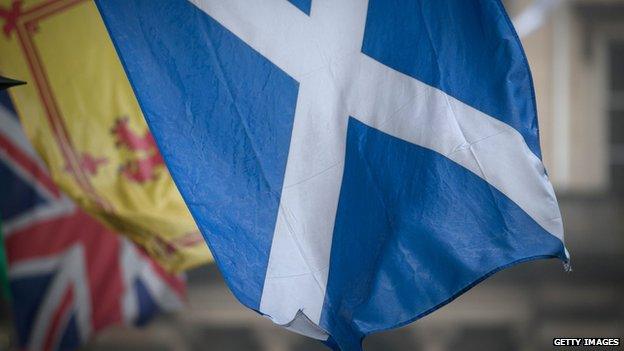Why does government do less for the North East than Scotland?
- Published
- comments

It did not feature much on the conference platform, but in the hurly burly of Labour's conference in Manchester the so-called English question loomed large - or what impact the planned, if vague, new constitutional settlement for Scotland should have on the way England is governed (and Wales and Northern Ireland too).
I stumbled on three themes.
One was the fury of Ed Miliband and his close circle with the prime minister - at what they saw as a cynical and short-termist attempt to turn English unease at the fiscal privileges going to Scotland into new voting procedures in the Commons that would favour the Tories.
A senior Labour official told me he didn't see how Ed Miliband could now negotiate the detail of Scotland's new budgetary arrangements with David Cameron, given the collapse of trust between the two.
All of which will increase the unease of Scottish nationalists that they may have been sold a hobbled pup of putative enhanced devolution by the main unionist parties in the closing days of the battle over whether Scotland would break free of the UK.
Federal structure
That said, if Cameron, Miliband and Clegg can swallow their personal animosities and sit round a table, what Labour would propose, or so I am told, would be a new federal structure for income tax.
This would divide income tax into a portion set by the UK chancellor of the exchequer, to cover the imputed proportional costs of UK-wide responsibilities, such as defence and diplomacy.
And then there would be a chunk reserved for Scottish responsibilities, including health, education and proposed additional elements of welfare.
The divide would be a bit spurious, in the sense that income tax - as opposed to other taxes, such as VAT - pays for only a chunk of total public services.
But this federal tax structure would give the Scottish parliament the wherewithal to expand or shrink the public sector according to the perceived needs of Scotland, and irrespective of what was happening in England, Wales and Northern Ireland.
And if Wales and Northern Ireland wanted similar partial control over taxes, this federal model would presumably be workable for them.
But possibly Scots would feel short-changed by Labour's proposal, when the Tories have offered to hand stewardship of all income tax to them.
Also, would handing this power to Scotland be seen by English people as equitable, in view of the other element of what the unionist parties offered Scotland, namely more generous funding in perpetuity of public services from Westminster, via the Barnett formula?
Scottish services better funded?
Which brings me to my third Labour conference theme on all this, namely that MPs did in fact queue up to tell me how unhappy their constituents were that the Scots were getting more money than them from the UK kitty for public services, plus the right to set their own taxes.
The perception is that the Scots' public services are significantly better funded than England's. And at the level of the whole of England and the whole of Scotland, that is true.
But it isn't the whole story. Poorer English regions, such as the North East, receive more public funding per head than England as a whole - though they still don't do as well as Scotland.
So total public spending on services is £8,529 per head in England, £10,152 in Scotland, and £9,419 in north-east England.
As it happens, in the important provision of healthcare, the North East is actually a bit more generously financed than Scotland, receiving £2,066 per head, compared with £2,051 north of the border - though just £1,662 in the South East.
So is the bellyaching I heard from Labour's northern MPs about Scotland receiving special favours unfounded?
Probably not, for two reasons.
The first is that the North East is much poorer than Scotland as a whole, and has a disproportionate number of people out of work and in poor health. So it has been the convention since World War Two that there should be an element of correcting these regional social and economic inequalities in the allocation of public funds.
Using gross disposable household income as a proxy for inequality, folk in the north east are 12% poorer than Scots, and yet they receive 7% less money for all public services.
It is perhaps not unreasonable for north-easterners to argue that is unfair.
No consensus
There is of course a school of thought that says public services should be earned, as it were, by the people who use them.
So there are Tory MPs in the South who say that the relatively small sums spent on health for their hardworking - and relatively prosperous - constituents is the true political crime.
Perhaps what these tensions and contradictory claims highlight more than anything is how there is no consensus about the regional distribution of taxpayers' money for public services.
And Scotland's new fiscal settlement has lit the touch paper on a potentially explosive national debate on all this.
One Labour MP, Nick Brown, told me he wanted a Barnett-style formula for all nations and regions - or a formula that allocates funding based on regional needs, such as the relative health of local people.
Or to put it another way, he wants to reduce the scope of governments to reallocate funds to constituencies and areas where a bit of de facto bribery might win precious votes at election time.
But assessing public service need is not hard science. There will always be an element of ideology and dirty politics in how public service funds are shared out.
That said, can anyone compellingly say why it is right to give comfort and confidence to the Scots that their public services will be generously resourced for years and years, while withholding that comfort from the people of the more deprived North East?